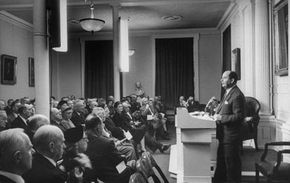Games
John von Neumann and Oskar Morgenstern introduced game theory to the world in 1943 with "Theory of Games and Economic Behavior." They hoped to find mathematical answers to economic problems.
According to economic theory, producers could make a greater profit by reacting to conditions such as supply and demand. But these theories fail to account for the strategies of other producers, and how the anticipation of those strategies affects each producer's moves. Game theory attempted to account for all of these strategic interactions. It didn't take long for military strategists to see the value in this.
Advertisement
When we discuss game theory, we assume a few things:
- A game is considered any scenario in which two players are able to strategically compete against one another, and the strategy chosen by one player will affect the actions of the other player. Games of pure chance don't count, because there's no freedom of choice, and thus no strategy involved. And one-player games, such as solitaire, aren't considered by game theorists to be games, because they don't require strategic interaction between two players.
- Players in a game know every possible action that any player can make. We also know all possible outcomes. All players have preferences regarding these possible outcomes, and, as players, we know not only our own preferences but also those of the other players.
- Outcomes can be measured by the amount of utility, or value, a player derives from them. If you prefer reaching point A to reaching point B, then point A has higher utility. By knowing that you value A over B, and B over C, a player can anticipate your actions, and plan strategies that account for them.
- All players behave rationally. Even seemingly irrational actions are rational in some way. For instance, if you were to play two games of pool, you wouldn't intentionally lose your money on the first game unless you believed that doing so would bolster your opponent's confidence when he or she was deciding how much to bet on game 2 -- a game you anticipate winning. This is an essential difference between one-shot and repeating games. In a one-shot game, you play once; in a repeating game, you play multiple times. (A little later, we'll look at how rational thinking varies between one-shot and repeating games.)
- If no player can reach a better outcome by switching strategies, the game reaches an impasse called the Nash Equilibrium. Essentially, this boils down to players keeping their current strategies (even if they don't have the highest preference) because switching won't accomplish anything.
In the next section, we'll put this information to use and see what we can learn about strategy by plotting it on a game tree.
